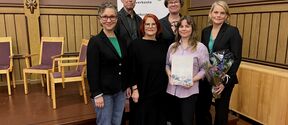Article on the emergence of novel solutions in multi-actor service systems awarded
Service Science Best Article of 2016 Awardees Recognized
Congratulations to Jaakko Siltaloppi (Aalto University), Kaisa Koskela-Huotari (Karlstad University), and Stephen L. Vargo ( University of Hawai‘i at Mānoa).
Their article, Institutional Complexity as a Driver for Innovation in Service Ecosystems, was selected as the Best Article in Service Science for 2016.
Nominations were received from members of the Service Science Section, and results determined based on voting by the journal's editorial board.
"Our paper, titled “Institutional complexity as a driver for innovation in service ecosystems”, focuses on the emergence of novel solutions in multi-actor service systems. Viewing innovation as institutional change, our paper starts by identifying the multiple institutional arrangements that guide and constrain human action. The multiple institutional arrangements overlap and sometimes contradict, creating incompatible prescriptions for action. This institutional complexity reduces the influence of prevailing institutions, enabling actors to combine the resources available through multiple institutional arrangements in novel ways—that is, enable them to innovate."
In this sense, the paper provides an institutional conceptualization of innovation that places diversity and reflexive problem-solving at the core of creating new solutions. This expands understanding on the early phase of the innovation process. Moreover, it advances the service-dominant logic by conceptually reconciling the stability of institutional arrangements with the actor-driven creation of novel solutions."
Jaakko Siltaloppi, Department of Industrial Engineering and Management, Aalto University, Finland
Kaisa Koskela-Huotari: CTF Service Research Center, Karlstad University, Sweden.
Steve Vargo: Shidler College of Business, Department of Marketing, University of Hawai’i at Manoa, USA.
For more information, see:
Siltaloppi, J., Koskela-Huotari, K. & Vargo, S. L. (2016). Institutional complexity as a driver for innovation in service ecosystems. Service Science, 8(3), 333-343.
http://pubsonline.informs.org/journal/serv#
--
Service Science publishes innovative and original papers on all topics related to service, including work that crosses traditional disciplinary boundaries. It is the primary forum for presenting new theories and new empirical results in the emerging, interdisciplinary science of service, incorporating research, education, and practice, documenting empirical, modeling, and theoretical studies of service and service systems.
Read more news

Environmental Structure of the Year 2025 Award goes to Kalasatama-Pasila tramway
The award is given in recognition of meritorious design and implementation of the built environment. Experts from Aalto University developed sustainability solutions for the project.Landscape architect Sara Korkeamäki received the Lappset scholarship
In her thesis, Korkeamäki examines the multidimensional challenge of biodiversity loss and seeks solutions to it through landscape architecture.
Professor of Ownership Samuli Knüpfer received the OP Financial Group Research Foundation's recognition award
OP Financial Group Research Foundation may award individuals who have significantly promoted economic research in fields supported by the foundation






